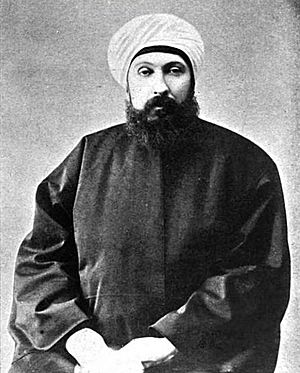Shaykh al-Islām facts for kids
The title Shaykh al-Islām (pronounced "Shaykh-ul-Islam") was a special honor given to very important Islamic scholars. It means "Elder of Islam" or "Leader of Islam." This title first appeared in a region called Khurasan around the 10th century AD.
At first, it was an informal title. It was given to religious experts whose advice (called fatwas) was very respected. A fatwa is like a religious opinion or answer to a question. In some places, rulers gave this title to scholars who had official jobs, but they weren't always the ones giving fatwas.
Later, in the Ottoman Empire, the title became official. The Shaykh al-Islām was the chief religious leader. They advised the sultan (the ruler) on religious matters and helped make government rules seem fair. They also helped choose judges. This important office was removed in 1924 when the Ottoman Empire ended. Today, similar roles are held by "grand muftis" in many countries.
Contents
What the Title Meant in Early Islam
In early Islamic times, "Shaykh al-Islām" was a respected title for wise scholars and religious teachers. It first showed up in Khurasan in the 10th century. In big cities there, only one person usually held the title at a time. These scholars were very influential, but they didn't always give religious opinions (fatwas).
Later, under empires like the Ilkhans, the Delhi Sultanate, and the Timurids, rulers often gave this title to high-ranking scholars. These scholars had different official jobs, but they were not usually the main people giving fatwas.
In places like Syria and Egypt, the title was given to respected religious lawyers. It was more of an honor than an official job. By the 1300s, in the central and western parts of the Islamic world, the title became strongly linked to giving religious opinions.
A famous scholar named Ibn Taymiyya was called "Shaykh al-Islām" by his supporters. However, some people disagreed with this. For example, a scholar named 'Ala' al-Din al-Bukhari said it was wrong to call Ibn Taymiyya by this title. But other scholars, like Ibn Hajar al-Asqalani, defended the use of the title for him. They said his importance was "brighter than the sun."
The Shaykh al-Islām in the Ottoman Empire
The Ottoman Empire was a very large and powerful empire that lasted from the 14th to the 20th centuries. In the Ottoman Empire, the main religious leader was called the Grand Mufti, and they held the title of Shaykh al-Islām.
The Ottomans had a clear system for their religious scholars. The Shaykh al-Islām was at the very top. This leader was chosen by the sultan from important religious judges. The Shaykh al-Islām even had the power to approve new sultans. However, once a sultan was approved, the sultan had more power than the Shaykh al-Islām.
The Shaykh al-Islām was very important because they issued fatwas. These were official religious opinions based on the Sharia, which is the Islamic law. These fatwas had a lot of authority over the people. In the 16th century, the power of the Shaykh al-Islām grew even more.
The office of Shaykh al-Islām was officially ended in 1924. This happened at the same time as the end of the Ottoman Caliphate. After the Grand National Assembly of Turkey was created in 1920, the Shaykh al-Islām's office was put under a special ministry. When the Caliphate was abolished, the office of Shaykh al-Islām was also removed. Today, in Turkey, a group called the Presidency of Religious Affairs continues some of the roles of the old Shaykh al-Islām.
Famous Scholars with the Title
Many respected Islamic scholars throughout history were given the honorific title "Shaykh al-Islām." Some of them include:
- Abu Mansur al-Maturidi
- Al-Bayhaqi
- Khwaja Abdullah Ansari
- Al-Nawawi
- Ibn Taymiyyah
- Ibn Hajar al-Asqalani
- Al-Suyuti
See also
 In Spanish: Shayj al-islam para niños
In Spanish: Shayj al-islam para niños
- Grand Mufti
- Mufti
- Sheikh
 | Charles R. Drew |
 | Benjamin Banneker |
 | Jane C. Wright |
 | Roger Arliner Young |



